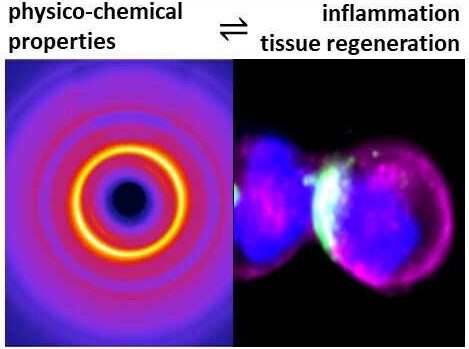______________
Role of the chito-structural code in controlling inflammatory and tissue regenerative processes in the frame of biomedical applications

About the Project
Chitin, one of the most abundant biopolymers on Earth, is insoluble in aqueous media and an important structural compound of arthropod shells, cephalopod endoskeletons, and fungal cell walls. Partial de-acetylation of chitin, a process found e.g. in human pathogenic fungi, promotes its solubility and changes its biological properties. Recent studies indicate that the amount and the pattern of the remaining acetyl groups, corresponds to a biochemical code, which is critical for the interaction with the biological environment. High degrees of acetylation were shown to induce cellular innate immune responses such as the activation of macrophages. In contrast, polymers with a low degree of acetylation are used in biomaterials promoting wound healing and tissue regeneration.
The aim of the proposed project is to better understand the structure-functional relationship between the chitin code (codeχ) and the biological response in mammalians. Based on our previous and preliminary studies, we intend to analyze the molecular crosstalk of chitin with the complement system, an ancient part of the humoral innate immune system, the chitin-binding protein YKL-40 and heparan sulfate proteoglycans, which we have recently identified as potential binding partners.
To understand the underlying codeχ controlling the broad range of biological properties of chitin and chitosan, we will perform interaction studies on the molecular level, in vitro experiments with mammalian cells and in vivo measurements using mouse models. Focus of our research are inflammatory events such as immune cell recruitment or regenerative processes such as angiogenesis. The basis for our research project are chito-polymer physical hydrogels, which are particularly suitable for in vitro experiments and the localized, minimally invasive in vivo application in mice.

Principal Investigators

PD Dr. Christian Gorzelanny
Universitätsklinikum Hamburg-Eppendorf
Zentrum für Innere Medizin
Klinik und Poliklinik für Dermatologie und Venerologie
Martinistraße 52
Campus Forschung N27
20246 Hamburg

Dr. Anayancy Osorio-Madrazo
Univerität Freiburg
Technische Fakultät
Institut für Mikrosystemtechnik (IMTEK)
Sensoren
Stefan-Meier-Straße 21
79104 Freiburg

